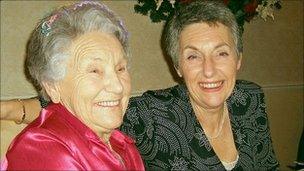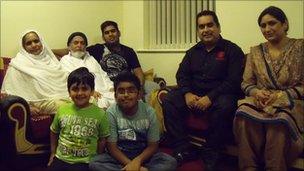Keeping elderly care in the family
- Published

Sue Cuomo moved in with her mother Audrey at the end of last year to care for her
As our population gets older, the cost of caring for the elderly and the demand on social care services is expected to rise. BBC News looks at why some families choose to care for their elderly relatives at home.
Sue Cuomo left her own home and moved in with her 87-year-old mother at the end of last year.
Audrey Cuomo has Alzheimer's disease and is no longer able to live independently.
"Her Alzheimer's is reasonably advanced," said Sue.
"She gets very confused... she has mobility problems, has had both knees replaced, she needs someone with her all the time.
"She doesn't want to go into a care home. She equates being in a care home with the workhouse."
Unpaid care
Sue, 64, spends almost all her time - apart from 12 hours a week when her sister takes over - caring for her mother at her flat in Morden, south London.
"I have basically given up my life, my retirement," she said.
"My mother is likely to go on for another eight to 10 years so I shall be in my 70s before I get a retirement.
"It is upsetting at times but I try not to think about it too often.
"I do the best I can. I was brought up to honour my parents.
"I would not dream of putting her in a home unless she was willing to go or she did not know."
In 2009/2010, 12% of people in England aged 16 or over were caring for a sick, disabled or elderly person, according to NHS statistics.
This equates to five million carers.
Research published by the University of Leeds in 2007 valued the unpaid care such people provided at about £87bn a year - 52% higher than research carried out by the charity Carers UK in 2002.
Matt Hill, spokesman for Carers UK, said he suspected the figure would be significantly higher in 2010.
He said the time spent caring by families had significantly increased - at a time when local authority-run support was in decline.
"Families have always done this," he said. "What's changed is the amount of support people can access through the local authority is declining.
"It's not just about the recent cuts, it's been declining for years.
"Things like meals on wheels, day centres - that social care has been going down for a number of years."
Spending cuts
Chancellor George Osborne announced in the government's Spending Review that there would be an extra £2bn available for social care within the next four years.
Mr Hill welcomed this pledge but said he was concerned that the money had not been ring-fenced, and with reductions to local authority budgets, there was a risk that social care and support services would still see cuts.
He urged local authorities to ensure they prioritised social care.

Sultan Ahmed, his parents, wife and three sons live together in two terraced houses
In Asian families, caring for your elderly parents in the home is often the norm.
Academics from Brunel University have been investigating family life within the South Asian population in England.
They interviewed 110 South Asian families living in the south of England and found that 90% of those people lived in multi-generational families - two or three generations under the same roof.
"Of all of these aged 50 and over, we found most lived with their children," said Professor Christina Victor, who carried out the research along with a colleague.
Social trend
Sultan Ahmed, 40, lives in Middlesbrough with his parents, who are both in their 70s, his wife Mayla Sultan and their three sons.
The family live in two terraced houses which they have joined together to make one big house.
For Mr Ahmed, who works as a taxi driver and a special police constable, putting his parents in a care home is not an option.
"I would rather give up everything than send my parents to a care home, even when they get frail," he said.
"Whatever we have to do we will do it."
Mr Ahmed's mother, Azmat Bibi, has arthritis and can only walk a few yards.
He takes both his parents out in the car to go shopping, attend hospital appointments - wherever they need to go.
"I have to miss work when I take them out but I put them first," he said.
"I put my family first.
"It does put on a strain sometimes but at the end of the day it's our responsibility. In Asian countries it's one of the jobs we have to do."
Prof Victor said it remained to be seen if this traditional way of living would change in time, as younger South Asian generations that have been brought up in the UK grow old.
About 10% of people aged 65 or more live in such a way in the UK, she said, adding that it was unlikely that more families would follow the South Asian population's lead.
"If they did it would mean the reversal of a social trend which has been happening in Britain since 1948," Prof Victor said.
"Ever since the Second World War, the tendency has been for older people and children to maintain independent households."